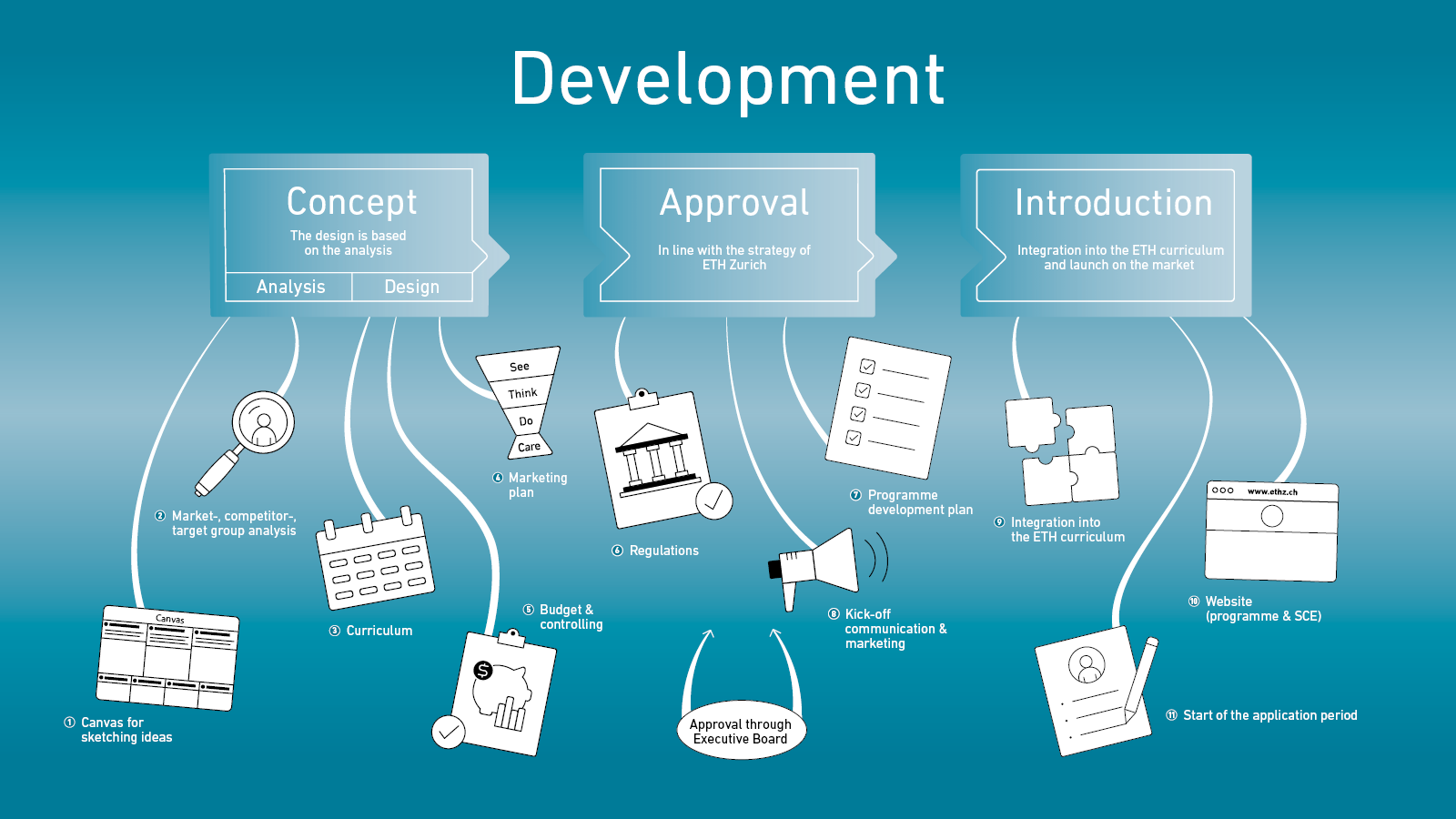Development and implementation
The development – from the idea for a new or revised programme to its start – lasts ten to fourteen months. The better your basis is, the smoother the process will be.
Development of a continuing education programme
Contact the for an initial discussion. In the discussion we will clarify issues relevant to the planned programme, time planning and finances. Then work can begin. Your SCE contact person will be at your side during the process which follows:

You can also download the guidelines for programme development or further development as a Download PDF (PDF, 526 KB).
In a first step, the canvas (1) helps to sort the ideas based on the most important questions.
The analysis (2) of target groups, needs and the environment form the foundation. The cornerstones of the development process are the market and competition analysis as well as the strategic benefits of the programme for ETH as a whole and the department. Depending on the needs of the target group, you decide on the format of the programme (3) (from CAS to MAS; from modular to monolithic, etc.).
The continuing education programme is part of the ETH curriculum and is therefore subject to its principles: from curriculum development and teaching quality to admission.
In order for the target group to become aware of the new and market-driven programme, time and resources are needed for communication and marketing (4). ETH is operating in a competitive market and must position itself as a provider of continuing education programmes.
By federal law a continuing education programme must be continuously financially viable, which is why sustainable and break-even financing (5) is necessary.
Before ETH Zurich launches a programme, it is thoroughly examined.
The department acts as the responsible body of a continuing education programme and must therefore also decide in advance on the creation of a new programme. However, the decision to introduce a continuing education programme is ultimately the responsibility of the Executive Board.
The Department Conference (DK) approves the study regulations (6) for the programme. The DK also appoints the programme directors in accordance with the study regulations and agrees to handle the necessary administrative processes via the study administration office.
Once the decision of the DK has been made, we prepare the dossier for the Executive Board meeting together with you. This includes the final programme development plan (PEP) and the study regulations. The PEP (7) includes the target group, the competencies, the lecturers, the market situation, the communication and the financial plan. The SCE compiles the Executive Board's proposal and coordinates it with the Rector.
The Executive Board approves the application. The regulations come into force. The programme is officially confirmed. The communication and marketing activities (8) are prepared so that they can be implemented quickly after the Executive Board's decision.
The continuing education programme is part of the curriculum at ETH Zurich and is thus subject to the regulatory and structural requirements of ETH.
The online application platform eApply and the course catalogue specify the deadlines. The programme can be launched as soon as it has been integrated into eApply and the course catalogue and the curriculum has been translated into the technical regulations (9). As soon as the continuing education programme has been published on eApply, potential participants can apply for the programme.
Your continuing education programme is published in the course catalogue and is binding for everyone. Participants know what to expect, how many ECTS credits they will receive, which performance assessments have to be passed and who will be lecturing.
Introduction to the market
Communication and marketing activities are running at full speed. The continuing education programme is published on the programme website and on the SCE website (10). Information events raise the interest of potential participants (11).
From concept to implementation: Are all preparations going as planned? Can we actually start the individual modules? The programme has to be continuously evaluated. The documents already drawn up during the development of the programme support the further development.
Helpful documents
- Weiterbildungsreglement der ETH Zürich (in German)
- Download Empfehlungen zur Qualitätsentwicklung von Weiterbildungsprogrammen (Swissuni - Verband universitäre Weiterbildung Schweiz (PDF, 165 KB), in German): You can use the criteria listed there to plan your programme. It is worth including them at an early stage, as this makes quality management much easier later on.
- Legal basis of ETH Zurich: Here you will find examples of regulations for other continuing education programmes.
- You can request templates for programme development plans and budgets from .